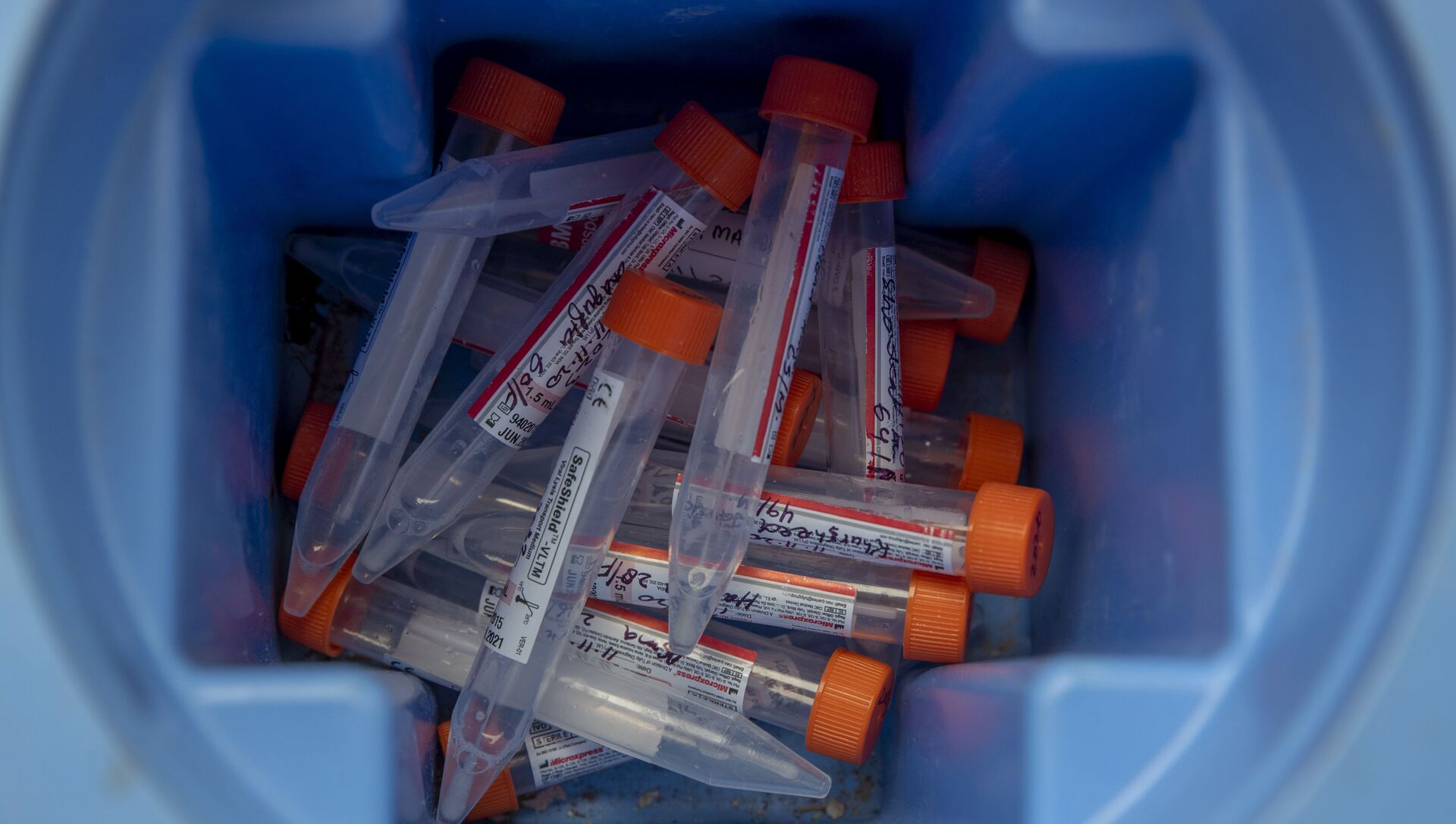https://sputnikglobe.com/20210720/the-olympics-nightmare-what-happens-if-an-athlete-tests-covid-19-positive-during-tokyo-games-1083424093.html
The Olympics Nightmare: What Happens If an Athlete Tests COVID-19 Positive During Tokyo Games
The Olympics Nightmare: What Happens If an Athlete Tests COVID-19 Positive During Tokyo Games
Sputnik International
The Tokyo Olympics, set to begin from 23 July after a year's delay due to the coronavirus pandemic, have been mired in controversy. COVID-19 infections are... 20.07.2021, Sputnik International
2021-07-20T19:52+0000
2021-07-20T19:52+0000
2022-11-30T10:05+0000
newsfeed
sport
2020 tokyo olympics
tokyo olympic games
2020 tokyo olympic games
olympics
olympics
olympics
summer olympics
sputnik
https://cdn1.img.sputnikglobe.com/img/07e5/04/0c/1082605192_0:212:3073:1950_1920x0_80_0_0_71b7d3e7dc6241da969382e99c8c0281.jpg
Tokyo 2020 organising committee's dreams of a trouble-free Olympics have been hit by major roadblocks just three days ahead of the opening ceremony as the tally of coronavirus infections continues to swell at the Games Village as well as other venues. Five athletes, including Czech volleyball player Ondrej Perusic and US gymnast Kara Eaker, have so far tested positive for the deadly virus.In another setback to the Games, 13 positive cases were reported on Monday. The total number of Olympics-related infections has now risen to 71 in the country.While the COVID-19 cases among volunteers and contractors can be managed by isolating such cases, the biggest challenge the organisers seem to be facing is how to deal with coronavirus-infected athletes once the competitions start at the quadrennial sports mega-event.The International Olympic Committee (IOC), in tandem with international sports federations, came up with Sport-Specific Regulations (SSR), explaining what needs to be done in case an athlete tests positive for coronavirus, but it left many questions unanswered.For instance, will a football team claim a silver medal if it is unable to compete in the final due to a positive test before the game?What Really Happens If an Athlete Tests Positive During the GamesAccording to IOC rules, any athlete or team that pulls out of the Olympics because of a positive COVID-19 test will not be automatically 'disqualified', instead they will be considered as 'did not start (DNS).'All athletes will undergo a coronavirus test on a daily basis and hence, for single-day competitions like weightlifting, shooting and athletics, all a participant will require is a negative test on the same day.However, the situation changes drastically in other sports, especially team sports like field hockey, football, beach volleyball and handball, where a team or a player testing positive will be replaced almost immediately.For example, if a team or an individual tests positive in the first round with multiple rounds still to be played, they would be withdrawn and the athlete or the team that they defeated will move to the next round.In track and field, if a competitor tests positive for coronavirus prior to the final, that person will be replaced by the next top-performing athlete from the heats.The situation can be best explained by referring to the final of the 100 metres sprint. Suppose if one of the eight runners set to participate in the final of the race tests positive, in which case the sprinter who was ranked ninth in the semis will replace him or her.In events like badminton, boxing and tennis, if a player's test comes out positive, he or she will not be replaced, rather the opponent gets a bye for a place in the next round.In case the scenario repeats itself in the final, for example, in men's singles in tennis, the player who tests positive will receive a silver medal while his rival will be given the gold medal.Guidelines for Wrestling and Football Create ConfusionContact sports such as wrestling have rules that differ quite a bit. For example, if a wrestler tests positive just before the gold medal clash, then that wrestler will be withdrawn and the player he or she defeated in the previous round will now compete in the final.Surprisingly, the grappler replacing the original finalist will not be regarded as 'close contact', despite challenging the positive wrestler on the mat a day earlier. But, the player will need a negative test to confirm his participation in the final.The IOC's guidelines for football, though, could be considered the most confusing, as the Olympic body's rule book only mentions that "FIFA shall decide on the matter at its sole discretion and take whatever action is deemed necessary."Experts Speak in Differing VoicesDespite the uncertainty surrounding the IOC's instructions in cases of positive tests, Indian Olympic Association (IOA) treasurer Anandeshwar Pandey claimed that there wasn't any confusion regarding the rules in the minds of the Indian contingent."The Indian athletes have been made aware of the rules in advance. Also, the support staff is updating them about the IOC's manual regularly, so understanding the rules shouldn't be a problem for our players", he told Sputnik on Tuesday.On the other hand, former badminton star Abhinn Shyam Gupta, who represented India in the Athens Olympics in 2004, disagreed with Pandey on the clarity of the rules."The IOC's regulations are certainly hard to understand for the players and it would have been better if these regulations were released last year", he said in comments provided to Sputnik on Tuesday.
Sputnik International
feedback@sputniknews.com
+74956456601
MIA „Rosiya Segodnya“
2021
Pawan Atri
https://cdn1.img.sputnikglobe.com/img/07e5/05/12/1082926219_0:0:358:358_100x100_80_0_0_aca1d9bdccc7af990e49b4511ee80344.png
Pawan Atri
https://cdn1.img.sputnikglobe.com/img/07e5/05/12/1082926219_0:0:358:358_100x100_80_0_0_aca1d9bdccc7af990e49b4511ee80344.png
News
en_EN
Sputnik International
feedback@sputniknews.com
+74956456601
MIA „Rosiya Segodnya“
Sputnik International
feedback@sputniknews.com
+74956456601
MIA „Rosiya Segodnya“
Pawan Atri
https://cdn1.img.sputnikglobe.com/img/07e5/05/12/1082926219_0:0:358:358_100x100_80_0_0_aca1d9bdccc7af990e49b4511ee80344.png
newsfeed, sport, 2020 tokyo olympics, tokyo olympic games, 2020 tokyo olympic games, olympics, olympics, olympics, summer olympics, sputnik, medal, medal, medals, medalist, gold medal, silver medal, tennis, tennis star, tennis greats, wrestling, football, hockey, hockey, boxing, match, matches, boxing match, corona, covid-19, coronavirus, athlete, athletes, international olympic committee, international olympic committee (ioc), controversy, rape, rape, rape, rape, composer, bullying, bullying
newsfeed, sport, 2020 tokyo olympics, tokyo olympic games, 2020 tokyo olympic games, olympics, olympics, olympics, summer olympics, sputnik, medal, medal, medals, medalist, gold medal, silver medal, tennis, tennis star, tennis greats, wrestling, football, hockey, hockey, boxing, match, matches, boxing match, corona, covid-19, coronavirus, athlete, athletes, international olympic committee, international olympic committee (ioc), controversy, rape, rape, rape, rape, composer, bullying, bullying
The Olympics Nightmare: What Happens If an Athlete Tests COVID-19 Positive During Tokyo Games
19:52 GMT 20.07.2021 (Updated: 10:05 GMT 30.11.2022) The Tokyo Olympics, set to begin from 23 July after a year's delay due to the coronavirus pandemic, have been mired in controversy. COVID-19 infections are rising at the Games venues, the Olympics composer Keigo Oyamada has been caught in a bullying scandal, while a man has been arrested for an alleged rape attempt at the Olympic Stadium.
Tokyo 2020 organising committee's dreams of a trouble-free Olympics have been hit by major roadblocks just three days ahead of the opening ceremony as the tally of coronavirus infections continues to swell at the Games Village as well as other venues. Five athletes, including Czech volleyball player Ondrej Perusic and US gymnast Kara Eaker, have so far tested positive for the deadly virus.
In another setback to the Games, 13 positive cases were reported on Monday. The total number of Olympics-related infections has now risen to 71 in the country.
While the COVID-19 cases among volunteers and contractors can be managed by isolating such cases, the biggest challenge the organisers seem to be facing is how to deal with coronavirus-infected athletes once the competitions start at the quadrennial sports mega-event.
The International Olympic Committee (IOC), in tandem with international sports federations, came up with Sport-Specific Regulations (SSR), explaining what needs to be done in case an athlete tests positive for coronavirus, but it left many questions unanswered.
For instance, will a
football team claim a silver medal if it is unable to compete in the final due to a positive test before the game?
What Really Happens If an Athlete Tests Positive During the Games
According to IOC rules, any athlete or team that pulls out of the Olympics because of a positive COVID-19 test will not be automatically 'disqualified', instead they will be considered as 'did not start (DNS).'
All athletes will undergo a coronavirus test on a daily basis and hence, for single-day competitions like weightlifting, shooting and athletics, all a participant will require is a negative test on the same day.
However, the situation changes drastically in other sports, especially team sports like field hockey, football, beach volleyball and handball, where a team or a player testing positive will be replaced almost immediately.
For example, if a team or an individual tests positive in the first round with multiple rounds still to be played, they would be withdrawn and the athlete or the team that they defeated will move to the next round.
In track and field, if a competitor tests positive for coronavirus prior to the final, that person will be replaced by the next top-performing athlete from the heats.
The situation can be best explained by referring to the final of the 100 metres sprint. Suppose if one of the eight runners set to participate in the final of the race tests positive, in which case the sprinter who was ranked ninth in the semis will replace him or her.
In events like
badminton, boxing and tennis, if a player's test comes out positive, he or she will not be replaced, rather the opponent gets a bye for a place in the next round.
In case the scenario repeats itself in the final, for example, in men's singles in tennis, the player who tests positive will receive a silver medal while his rival will be given the gold medal.
Guidelines for Wrestling and Football Create Confusion
Contact sports such as wrestling have rules that differ quite a bit. For example, if a wrestler tests positive just before the gold medal clash, then that wrestler will be withdrawn and the player he or she defeated in the previous round will now compete in the final.
Surprisingly, the grappler replacing the original finalist will not be regarded as 'close contact', despite challenging the positive wrestler on the mat a day earlier. But, the player will need a negative test to confirm his participation in the final.
The IOC's guidelines for football, though, could be considered the most confusing, as the Olympic body's rule book only mentions that "FIFA shall decide on the matter at its sole discretion and take whatever action is deemed necessary."
Experts Speak in Differing Voices
Despite the uncertainty surrounding the IOC's instructions in cases of positive tests, Indian Olympic Association (IOA) treasurer Anandeshwar Pandey claimed that there wasn't any confusion regarding the rules in the minds of the Indian contingent.
"The Indian athletes have been made aware of the rules in advance. Also, the support staff is updating them about the IOC's manual regularly, so understanding the rules shouldn't be a problem for our players", he told Sputnik on Tuesday.
On the other hand, former badminton star Abhinn Shyam Gupta, who represented India in the Athens Olympics in 2004, disagreed with Pandey on the clarity of the rules.
"The IOC's regulations are certainly hard to understand for the players and it would have been better if these regulations were released last year", he said in comments provided to Sputnik on Tuesday.




